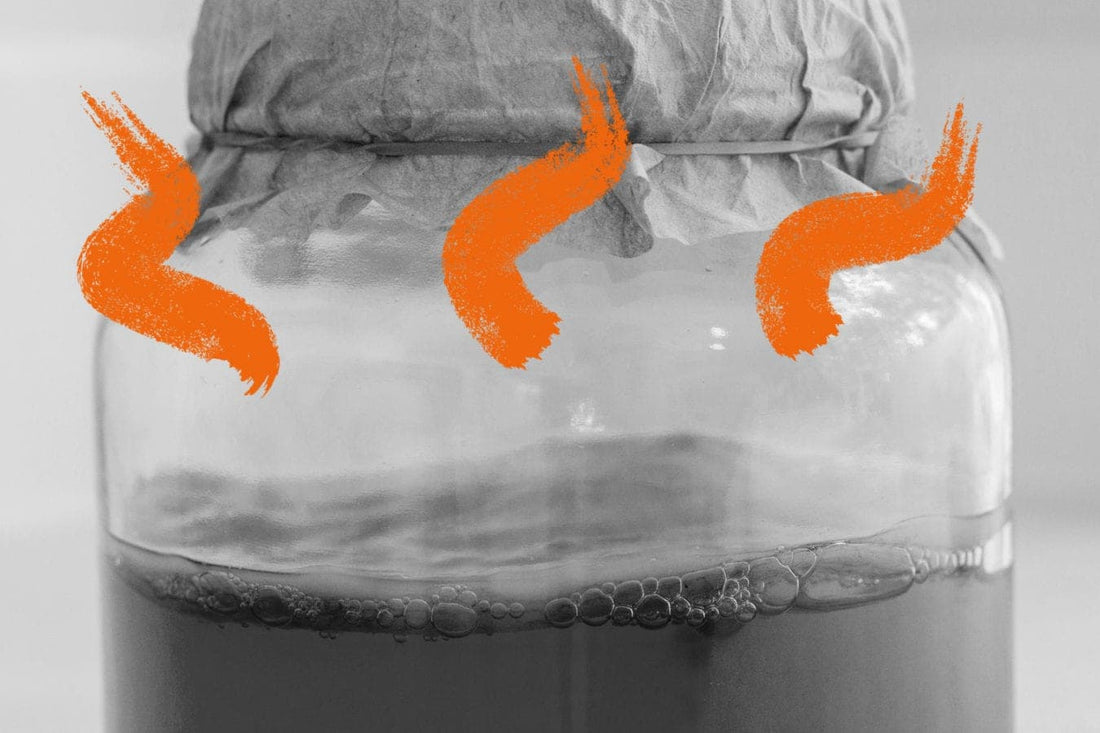Once upon a time, every home had pots and pots of different foods in various stages of fermentation. There is no part of the world that doesn’t have a tradition of fermentation, whether you're talking about alcoholic beverages, sauerkraut, kimchi, miso, cheese, bread, soy sauce, salami or our own kombucha.
But over the last 50 years or so, many cultures have lost a big part of the skills and traditions surrounding food fermentation.

What is fermentation?
Fermentation is a natural process relating to the transformative action of microorganisms on various foods. It is nature’s way of preserving these foods, and it makes them palatable over the winter months.
In many cultures, fermentation had a mystic fascination. Imagine dropping a few apples into water and over days watching it boil and bubble with no heat at all, then drinking the resulting liquor and finding you were transported into another world. Consequently, fermentation became a ritual in many societies, controlled by the elders or medicine men.
Fermentation was once a core and necessary part of the forest-or-farm-to-table process. When foraging for fruits and vegetables, particularly in autumn shortly before the end of abundance, or farming produce in much larger quantities, preservation through the winter was a major issue.
Meat might be salted, and fruits cooked into conserves, but fermentation was much the most reliable and longest-term method of preservation.

The flavour of fermentation
Just as importantly, fermentation develops fantastic tart, sour, full flavours from foods that may be dull or boring themselves, particularly at a time of year when the range of flavour options is very limited. Cracking open a crock of deeply fermented sauerkraut at Christmas when the only other fresh produce were carrots and turnips must have seemed like absolute heaven.
But with the invention of widescale refrigeration, the expansion of industrial food processing and the trend to fly fresh produce all over the world, fermentation fell out of favour.
The 50s and 60s were a great moment of domestic change. Appliances of all sorts freed us from being chained to the kitchen sink; supermarkets became much more widespread, so vegetable gardening declined. Processed foods in cans and packets were the height of fashion. If a crock of fermented cabbage were seen on the shelf, it meant you hadn't moved with the times.
But as we are beginning to realise, our love affair with sweet, sugary, processed foods, as well as the cheap calories of carbohydrates and fast meals on the go, have had a terrible effect on our health.
The great news is that, 50 years on, a counter trend is on its way...
Fermentation and gut health
The recent reemergence of fermentation has come ostensibly from a belief that fermented foods are healthy. Over the past 150 years, since Pasteur and Koch, bacteria and other microbes have been seen as the enemy. Flemming et al, in the 1930s, gave us penicillin and other antibiotics that act indiscriminately to kill bacteria both good and bad. And from the 1950s, marketing has turned bacteria into a universal evil to be killed at all cost.
Due to recent research into the microbiome, however, we are beginning to understand the positive impact of our gut bacteria on all sorts of diseases. Healthy digestion is clearly linked to a healthy gut, particularly the range and breadth of our gut bacteria.
We are also beginning to link the increase in allergies to a decline in our gut bacteria, and early exposure to various pathogens. Even more recently, research has begun to suggest that our mental health, and even serious mental diseases such as Alzheimer's, may be linked to our gut microbiome.
We are not suggesting that drinking a bottle of kombucha a day is going to have a sudden impact on your health. As Ed Yong stated, the bacteria in most probiotics is like a gentle breeze rustling papers on a warm day: it is insufficient to make a major impact. But fermented foods have been part of our diet for millennia and we may just find out, in time, that they are a necessary element that we have reduced too far.
Fermentation: no passing fad
But it is not only direct health that has increased this interest. The acceleration of our lives, the slow decline of our cultures and communities, and the frightening rise in mental health problems has led us to reflect on past times. A particular movement that has emerged from this is Slow Food. And what, we ask you, is slower than fermentation?
What are the alternatives? As we reduce our dependence on sugary and salty foods, processed fats and low glycemic index carbohydrates, what else is out there that can feed our craving for flavour?
We are re-learning to love straightforward fruits and green vegetables, raw or lightly-cooked and unadulterated, free-range meats; dairy and eggs, leanly prepared. Why not spice all of that up with a fabulous tart pickle, a big dollop of sauerkraut, or accompany it with an aromatic Sparkling tea, naturally low in sugar and alcohol free, and with all the goodness of both tea and a fully fermented brew.
Sounds like very heaven to us! Interested in experiencing this for yourself? Contact REAL Drinks or buy online now!

